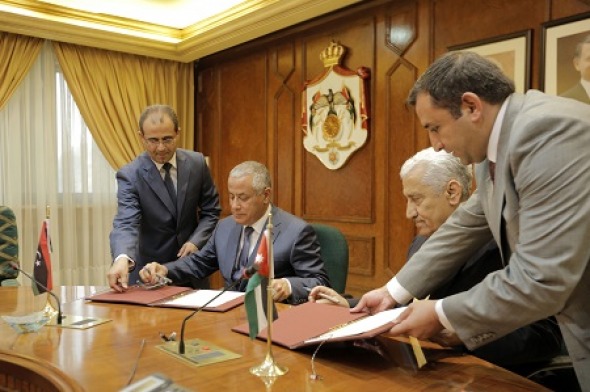By Abdul Jalil Mustafa.

Amman, 1 December 2013:
The Prime Minster and his Jordanian counterpart, Abdullah Ensour, have signed an agreement in Amman . . .[restrict]aiming to create “strategic” relationship between that two countries “driven by common interest and a political will for growth”, according to the Jordanian news agency Petra.
The agreement covers Jordanian help in a wide rage of fields – military and security, health, tourism and medical tourism, culture, higher education and scientific research, and economy and trade.
Specifically, it activates a Higher Libyan-Jordanian Commission which, co-chaired by the two prime ministers, will hold its first meeting in the coming few months.
The agreement followed extensive talks between the two prime ministers and ministerial teams in the morning.
Zeidan flew to Amman yesterday accompanied by Foreign Minister Mohamed Abdulaziz, Health Minister Noureddin Dughman, and Culture Minister Habib Al-Amin, Higher Education Minister Mohamed Hassan Abu Bakr and officials from the Interior and Defence ministries.
The Libyan-Jordanian ministerial summit should have taken place time ago but was delayed because of the political crisis in Libya.
“We were looking forward to this meeting which was delayed due to the instability in Libya over the past period and which prevented closer contact,” the Jordanian Prime Minister was quoted by Petra as saying.
Jordan, he said, was keen to provide Libya with specific skills to help it develop. Zeidan’s visit would now boost Libyan-Jordanian ties and allow that to happen, he believed.
His country possessed human resources and skills which would be of use to Libya, mentioning health, tourism and medical tourism sectors, he said. Ensour also singled out Jordan’s banking system and its construction industry. These could contribute to Libya’s reconstruction effort, he stated.
Zeidan praised the ties that had existed between the Jordan and the Libya under King Idris and apologised for not having been to Amman sooner. “This visit was delayed and should have come earlier to express our gratitude and appreciation for the efforts Jordan had made to assist Libya,” he said, referring to the treatment of sick and injured Libyans in Jordan.
As to outstanding bills for their treatment, he blamed it on the “inadequate” Libyan financial and banking system, but stated that 80 percent of the costs had been covered and the rest of the amount was deposited with the Central Bank.
Following the revolution, Jordan trained 10,000 Libyan policemen and received a large number of Libyan patients, particularly revolutionaries, who were injured in the fighting against the former regime.
The delay in paying debts to Jordanian hospitals and hotels is viewed in Jordan as reflecting negatively on ties between the two countries. It is estimated that unpaid bills to the Jordanian private health sector and to hotels for accommodating patients and their families amount to $80 million.
Zeidan expressed gratitude to Jordan for the hospitalisation of the tens of thousands of Libyan patients.
Libya wanted to benefit from the Jordan’s expertise, he said, particularly in the fields of training and building up capabilities in the defence and police spheres as well as in the fields of water, transport, communication, culture and media,” the statement from Ensour’s office said.
“Libyans are a conservative people who yearn to the establishment of a state that respects traditions but has a tendency towards modernisation. This is the common ground where Jordan and Libya meet,” Zeidan was quoted as saying. [/restrict]







